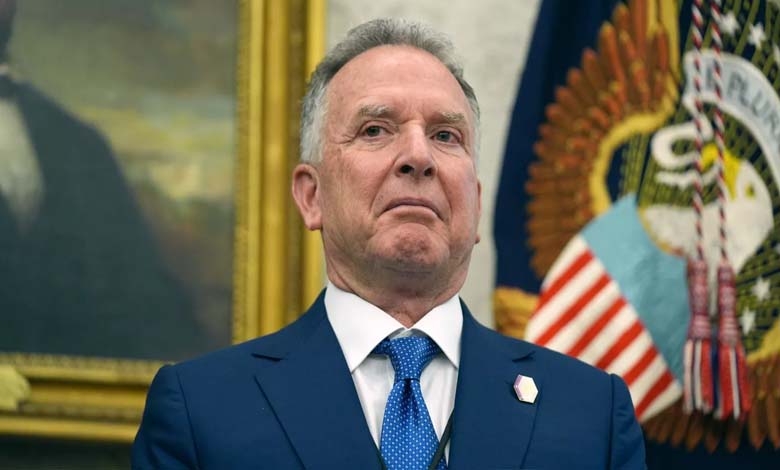US Moves to Expand Abraham Accords to Include Mauritania

The Wall Street Journal reports that Mauritania’s potential inclusion in the Abraham Accords would mark a pivotal step in strengthening Israel’s network of relationships in Africa.
The United States is accelerating efforts to revive normalization talks between Israel and several Arab nations, as negotiations appear close to announcing a comprehensive ceasefire in Gaza. New reports suggest that Mauritania could be the next country to join the normalization process, widely known as the Abraham Accords.
-
Algerian move to disrupt the Morocco-Mauritania rapprochement
-
Jama’at Nasr al-Islam wal Muslimin Attempts to Infiltrate Mauritania and Senegal: What Is It Planning?
According to the Wall Street Journal, US officials have recently facilitated undisclosed meetings between Mauritanian and Israeli officials on the sidelines of a security and economic summit in Washington, which brought together US President Donald Trump and five West African leaders, including Mauritanian President Mohamed Ould Ghazouani.
Diplomatic sources told the newspaper that Washington is aiming to restore formal ties between Nouakchott and Tel Aviv, which have been severed for more than 13 years, as part of a broader effort to reactivate normalization initiatives with Arab states. This comes after progress in ceasefire talks between Israel and Hamas and renewed US pressure to reach a “lasting regional solution” to the conflict.
-
Mauritania Warns: The “African Sahel” Region among the World’s Most Severe Crisis Hotspots
-
Mauritanian Cleric Issues Fatwa: Vitiligo is Caused by a “Lick from Satan”
Historically, Mauritania established full diplomatic relations with Israel in 1999, under the leadership of former President Maaouya Ould Sid’Ahmed Taya, becoming the third Arab country—after Egypt and Jordan—to take such a step. However, relations were frozen following Israel’s offensive on Gaza in 2008–2009, and officially cut in 2010 due to widespread political and popular pressure.
Since then, Nouakchott has remained silent on the issue of normalization. Yet analysts suggest that backchannel contacts with Israel have continued discreetly, awaiting more favorable regional conditions, such as a permanent ceasefire or broad economic arrangements.
-
Libya-Mauritania Agreement to Revitalize the Arab Maghreb Union Undermines Algeria’s Plan
-
What are the main achievements made by Mauritania under the leadership of Mohamed Ould El Ghazaouani?
According to the Wall Street Journal, the Trump administration—having reaffirmed its support for the Abraham Accords during the recent African summit—sees Mauritania as a “promising partner” due to its strategic location and proximity to Morocco, which normalized ties with Israel in 2020.
Well-informed US sources say the incentives on the table include direct economic support, expanded infrastructure and energy investments, and security cooperation under a strategic partnership with Washington—in exchange for Mauritania’s re-engagement in formal relations with Israel.
-
What is the impact of Ould El Ghazaouani’s decision to run for presidency again in Mauritania on the Brotherhood in the country?
-
Mohamed Ould El Ghazaouani… The Tranquil President of Mauritania
However, domestic sentiment in Mauritania is complex. President Ould Ghazouani faces significant political and popular opposition to any move toward normalization, particularly given the volatile situation in Gaza and the ICC’s war crimes charges against Israeli Prime Minister Benjamin Netanyahu.
Mauritanian presidential sources swiftly denied rumors of a planned meeting between Ould Ghazouani and Netanyahu during the Washington summit, asserting that Mauritania’s stance remains “firm” in supporting the Palestinian cause, as reported by Al Jazeera.
-
The Mauritanian President Raises the Slogan “Fight Against Corruption
-
Mauritania Thanks the EAU for Supporting its Multi-Use Water Transfer Project from the River Bank to Central States
The normalization rumors coincide with growing signs of an impending ceasefire deal in Gaza, brokered by the United States, Qatar, and Egypt. Analysts believe that any agreement ending the bloody conflict since October 2023, and laying a political roadmap for the post-war period, could open the door for further Arab normalization steps—alongside Gaza’s reconstruction and defined Israeli commitments.
Mauritania’s renewed participation in the Abraham Accords would provide Israel with a strategic gateway into West Africa and offer Washington a diplomatic achievement ahead of the upcoming November elections.
-
Mauritania Joins the Ranks of Gas Exporting Countries
-
Morocco begins Atlantic Initiative by reducing buffer zone with Mauritania
Nevertheless, political and grassroots groups in Mauritania warn that any move to restore ties with Israel would face widespread resistance—especially from Islamist and leftist factions who view normalization as a “betrayal of the Palestinian cause” and reject recognition of Israel without the establishment of an independent Palestinian state.
Mass protests that erupted in Mauritania following the 2009 Gaza war remain a stark reminder of the public backlash against normalization, which helped push the government to cut ties with Tel Aviv.
-
Mauritania fears the deterioration of Sahel Countries’ ties and the strengthening of terrorists’ grip
-
The president of Mauritania establishes a new government
Amid intersecting diplomatic agendas and a sensitive internal context, the future of Mauritania-Israel relations hinges on the outcome of ceasefire talks and Nouakchott’s ability to balance international interests with domestic public opinion.
Despite official denials, the repeated appearance of the topic in US media and Israeli diplomacy may indicate that real developments are underway—possibly to be revealed in the weeks or months ahead.












